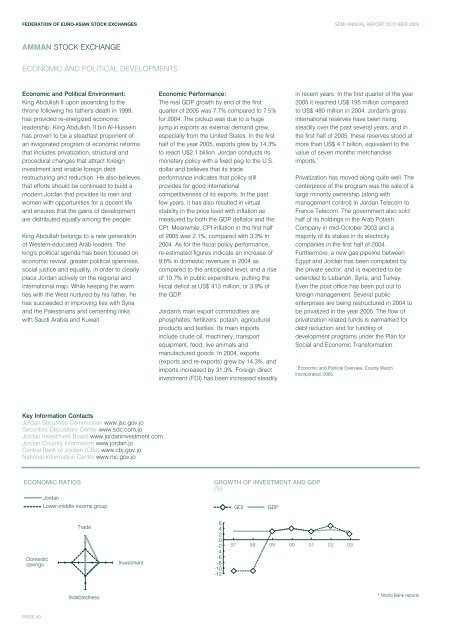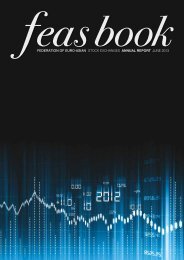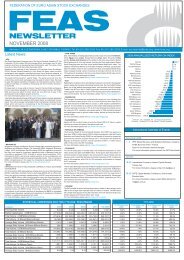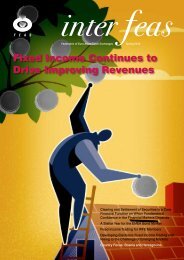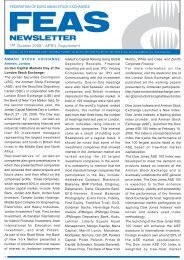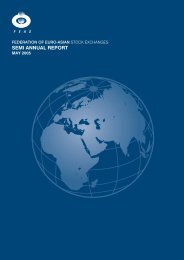Download - FEAS
Download - FEAS
Download - FEAS
You also want an ePaper? Increase the reach of your titles
YUMPU automatically turns print PDFs into web optimized ePapers that Google loves.
FEDERATION OF EURO-ASIAN STOCK EXCHANGES SEMI ANNUAL REPORT OCTOBER 2005<br />
AMMAN STOCK EXCHANGE<br />
ECONOMIC AND POLITICAL DEVELOPMENTS<br />
Economic and Political Environment:<br />
King Abdullah II upon ascending to the<br />
throne following his father's death in 1999,<br />
has provided re-energized economic<br />
leadership. King Abdullah, II bin Al-Hussein<br />
has proven to be a steadfast proponent of<br />
an invigorated program of economic reforms<br />
that includes privatization, structural and<br />
procedural changes that attract foreign<br />
investment and enable foreign debt<br />
restructuring and reduction. He also believes<br />
that efforts should be continued to build a<br />
modern Jordan that provides its men and<br />
women with opportunities for a decent life<br />
and ensures that the gains of development<br />
are distributed equally among the people.<br />
King Abdullah belongs to a new generation<br />
of Western-educated Arab leaders. The<br />
king's political agenda has been focused on<br />
economic revival, greater political openness,<br />
social justice and equality, in order to clearly<br />
place Jordan actively on the regional and<br />
international map. While keeping the warm<br />
ties with the West nurtured by his father, he<br />
has succeeded in improving ties with Syria<br />
and the Palestinians and cementing links<br />
with Saudi Arabia and Kuwait.<br />
Key Information Contacts<br />
Jordan Securities Commission www.jsc.gov.jo<br />
Securities Depository Center www.sdc.com.jo<br />
Jordan Investment Board www.jordaninvestment.com<br />
Jordan Country Information www.jordan.jo<br />
Central Bank of Jordan (CBJ) www.cbj.gov.jo<br />
National Information Center www.nic.gov.jo<br />
ECONOMIC RATIOS<br />
Domestic<br />
savings<br />
PAGE 40<br />
Jordan<br />
Lower-middle-income group<br />
Trade<br />
Indebtedness<br />
Investment<br />
Economic Performance:<br />
The real GDP growth by end of the first<br />
quarter of 2005 was 7.7% compared to 7.5%<br />
for 2004. The pickup was due to a huge<br />
jump in exports as external demand grew,<br />
especially from the United States. In the first<br />
half of the year 2005, exports grew by 14.3%<br />
to reach U$2.1 billion. Jordan conducts its<br />
monetary policy with a fixed peg to the U.S.<br />
dollar and believes that its trade<br />
performance indicates that policy still<br />
provides for good international<br />
competitiveness of its exports. In the past<br />
few years, it has also resulted in virtual<br />
stability in the price level with inflation as<br />
measured by both the GDP deflator and the<br />
CPI. Meanwhile, CPI inflation in the first half<br />
of 2005 was 2.1%, compared with 3.3% in<br />
2004. As for the fiscal policy performance,<br />
re-estimated figures indicate an increase of<br />
9.6% in domestic revenues in 2004 as<br />
compared to the anticipated level, and a rise<br />
of 10.7% in public expenditure, putting the<br />
fiscal deficit at US$ 413 million, or 3.9% of<br />
the GDP.<br />
Jordan's main export commodities are<br />
phosphates, fertilizers, potash, agricultural<br />
products and textiles. Its main imports<br />
include crude oil, machinery, transport<br />
equipment, food, live animals and<br />
manufactured goods. In 2004, exports<br />
(exports and re-exports) grew by 14.3%, and<br />
imports increased by 31.3%. Foreign direct<br />
investment (FDI) has been increased steadily<br />
GROWTH OF INVESTMENT AND GDP<br />
(%)<br />
6<br />
4<br />
2<br />
0<br />
-2<br />
-4<br />
-6<br />
-8<br />
-10<br />
-12<br />
97<br />
GDI GDP<br />
in recent years. In the first quarter of the year<br />
2005 it reached US$ 195 million compared<br />
to US$ 480 million in 2004. Jordan's gross<br />
international reserves have been rising<br />
steadily over the past several years, and in<br />
the first half of 2005, these reserves stood at<br />
more than US$ 4.7 billion, equivalent to the<br />
value of seven months' merchandise<br />
imports. 1<br />
Privatization has moved along quite well. The<br />
centerpiece of the program was the sale of a<br />
large minority ownership (along with<br />
management control) in Jordan Telecom to<br />
France Telecom. The government also sold<br />
half of its holdings in the Arab Potash<br />
Company in mid-October 2003 and a<br />
majority of its stakes in its electricity<br />
companies in the first half of 2004.<br />
Furthermore, a new gas pipeline between<br />
Egypt and Jordan has been completed by<br />
the private sector, and is expected to be<br />
extended to Lebanon, Syria, and Turkey.<br />
Even the post office has been put out to<br />
foreign management. Several public<br />
enterprises are being restructured in 2004 to<br />
be privatized in the year 2005. The flow of<br />
privatization related funds is earmarked for<br />
debt reduction and for funding of<br />
development programs under the Plan for<br />
Social and Economic Transformation.<br />
1 Economic and Political Overview, County Watch<br />
Incorporated, 2005<br />
98 99 00 01 02 03<br />
* World Bank reports


